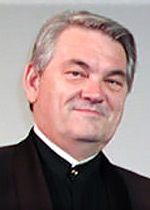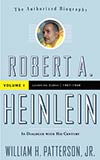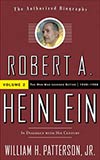William H. Patterson, Jr.
| Full Name: |
William
H.
Patterson |
| Born: |
|
| Occupation: |
Writer |
| Nationality: |
American |
| Links: |
|
Biography
William H. Patterson, Jr. (1951 - ). SF theory, Heinlein, Cabell specialist. Born in St. Louis, Missouri, he relocated with his family at an early age to Terre Haute, Indiana for four years. The shock of getting to kindergarten and first grade in snowdrifts over his head made an indelible mark. His father, whose childhood tuberculosis in the 1930's and subsequent malaria required a drier climate, moved the family to Phoenix, Arizona in 1956, and Bill spent the next twenty-one years in the high desert, attending Arizona State University for two years as a History major specializing in German history between WWI and WWII.
In 1969 he joined the Phoenix Public Library's science fiction club and became one of Phoenix's most active fans, working on the convention committees for the local Phoenix convention, Leprecon, and was instrumental in bringing about the 1978 World Science Fiction Convention, IguanaCon II. He wrote an 80,000 word history of Phoenix Fandom up to and including IguanaCon published in very small editions as The Little Fandom That Could.
Bill PattersonIn the mid 1980's, after relocating to San Francisco, he became interested in applying formal critical methods to science fiction and particularly to Heinlein criticism and founded the Heinlein Journal in 1997 and co-founding the Heinlein Society with Virginia Heinlein in 1998.
In 1999, he undertook to pull together everything that had been published about Robert Heinein's life in a biographical sketch published in The Heinlein Journal and since republished, in truncated form, on the Heinlein Society website and in Alexei Panshin's Abyss of Wonder website. During the writing of that biographical sketch, he was brought into contact with Virginia Heinlein by Brad Linaweaver. Mrs. Heinlein helped verify the factual accuracy of the sketch and added some commentary as well.
On January 1, 2000, Mrs. Heinlein phoned Bill and asked him to undertake the formal biography of her husband, which he commenced researching in February 2000. The research phase occupied the years 2000 through about 2003, and he commenced writing in the latter part of 2002. Mrs. Heinlein saw and approved the first 120,000 words of the biography (including the Heinlein family history which has been moved to an Appendix in the published first volume of the biography).
Following Mrs. Heinlein's death in January 2003, he was asked by the newly-formed Heinlein Prize Trust, to consult with the Robert A. Heinlein Archive of Special Collections and Archives of the University of California, Santa Cruz's McHenry Library in integrating the material coming to the collection from Mrs. Heinlein's working files. As there was very nearly as much "new" material as already existed in the Archive, he had to make extensive re-organization of the files, preparing them for public accessibility. The research phase re-commenced for the next two years, as the writing simultaneously progressed. Each volume of the biography was drafted at approximately 375,000 words, and then cut to approximately 300,000 for submission in 2006.
During the writing and second phase of research, the Heinlein Prize Trust also commenced its Virginia Edition project of the Collected Works of Robert A. Heinlein, initially tasking Bill with locating manuscripts; however, the absence of a series editor in the Meisha Merlin structure meant that substantial editorial functions devolved on his, as well as writing extensive endnotes telling what was going on in Heinlein's life when he wrote the various works.
Beginning in 2005, he helped organize the Heinlein Centennial which took place in Kansas City over the July 7, 2007, weekend.
An independent scholar, his theoretical and critical papers have been presented in conferences of the Popular Culture Association and the American Comparative Literature Association, and published in The Heinlein Journal (including a series of depth studies of Heinlein's first stories, to "Blowups Happen")and in the British science fiction academic journal, Extrapolation. He wrote the narrative material for the 2006 issue of Firsts Magazine, "Collecting Robert Heinlein." An extended essay on Heinlein's source-relationship with James Branch Cabell, "The Heir of James Branch Cabell: The Biography of the Biography of the Life of Manuel (A Comedy of Inheritances) won the 2000 Cabell Prize of the Commonwealth University of Virginia, which is archived on the Cabell Library's website.
Co-Author with Andrew Thornton of The Martian Named Smith: Critical Perspectives on Robert Heinlein's Stranger in a Strange Land (2002). He has been designated The Heinlein Scholar of the Heinlein Prize Trust.
Works in the WWEnd Database



















 Full Details
Full Details








